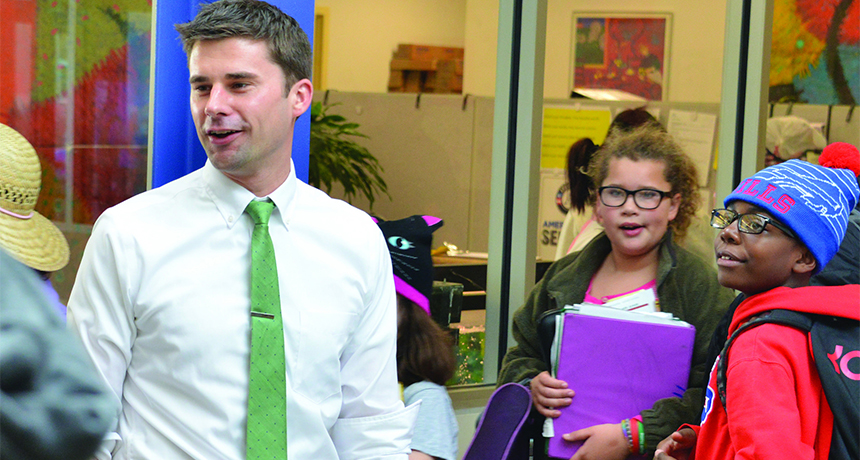Service Learning
Service Learning is a pedagogical method that enables students to apply course concepts to a “real life” experience that meets a community need and to reflect upon all aspects. It involves student work generally with disadvantaged and underserved individuals or groups.
The basic aim of service-learning is two-fold: first, that students’ service will heighten the understanding of central academic themes, goals or subject matter in their courses; second, that the academic course content will facilitate students’ ability to reflect in deep and meaningful ways on their experiences of social justice.
Canisius students enrolled in all majors and programs of study participate in service learning. The typical service learning hour requirement is 15-20 hours per academic semester.
Early Field Experiences
Clinical practice prior to the student teaching experience are commonly referred to as early field experiences. Early field experience hour requirements range from 10-50 hours per semester. Teacher candidates complete a minimum of 100 early field experience hours prior to student teaching.
Early field experiences are integrated into coursework, occur in a variety of settings and allow the teacher candidate to actively participate in a classroom environment. Teacher candidates are supported as they incrementally take on instructional responsibilities and move from a period of focused observation to tutoring individual and small groups of students to developing and teaching lessons. Specific assignments and reflection with a College faculty member allow candidates to focus on critical aspects of classroom teaching and interactions and to integrate theory and practical application. Teacher candidates are placed in partnership schools and community organizations with mentor teachers who provide formative feedback to guide development of teaching skills and professional interactions.
Teacher candidates must pass the early field experience evaluation of performance, essential knowledge and critical dispositions in order to be eligible to move on to the next level of coursework/field experience.
Pre-Student Teaching
Pre-student teaching is an intensive field based course designed to lay the foundation for the capstone student teaching experience. Teacher candidates complete extensive hours in a classroom in a supervised experience which allows them to develop a relationship with the students and mentor teacher, create instructional plans, teach a learning segment and assess student learning.
Teacher candidates must meet all Transition II criteria, including overall GPA, course completion, course grades, clinical practice evaluations and common assignments to be eligible to advance to the student teaching semester.
Typically, the teacher candidate will return to the same classroom to complete the first student teaching placement for an extended field experience opportunity.
Student Teaching
Student teaching is an intensive fourteen-week experience in a P-12 school. It is the culminating field experience in teacher preparation in which the teacher candidate gradually assumes full teaching responsibility under the joint supervision of a mentor teacher and a college supervisor.
Placement 1:
A full time seven-week student teaching experience. This placement is often a continuation of the pre-student teaching placement. The candidate follows the P-12 school calendar and fully participates as an instructional leader and staff member. During the first placement the teacher candidate completes the teacher performance assessment (TPA) as a requirement for NYS certification. Reflection essays and successful interim and final evaluations are also required.
Placement 2:
A full time, seven-week student teaching experience. The candidate follows the P-12 school calendar and fully participates as an instructional leader and staff member. A peer video review assignment, reflection essays, and successful interim and final evaluations are required.
Student teaching provides teacher candidates the opportunity to practice the craft of teaching and to ask important questions about teaching and learning in a supportive school environment. Student teachers are fully immersed in the daily work of professional educators: building relationships, planning curriculum, delivering instruction and assessing student learning to continue the cycle of effective teaching and learning.
Student teaching takes place in a wide variety of classroom settings and schools, including public, private, Catholic and charter schools in Buffalo and the Western New York region. Teacher candidates complete a minimum of two student teaching placements, each in a different grade level according to the requirements of the specific teaching certificate for which he or she is preparing. Candidates can also expect to be learning to teach in the discipline or subject area for which they are seeking certification.
During the student teaching semester, teacher candidates are guided and supported by two key individuals – the college supervisor and the mentor teacher - who work collaboratively to support the growth and development of the teacher candidate.
College Supervisors are experienced educators who serve as a liaison between the teacher candidate, the Office of Educational Partnerships and the school partner. Supervisors are the primary mentor and advocate for the teacher candidate across the two placement student teaching experience.
Mentor Teachers model effective teaching practice, encourage inquiry and reflection and monitor the growth and development of a teacher candidate during field experiences.
For more information about student teaching, contact:
Elizabeth Turner '04, MsEd '08
Director of Educational Partnerships
(716) 888- 2768
@email

